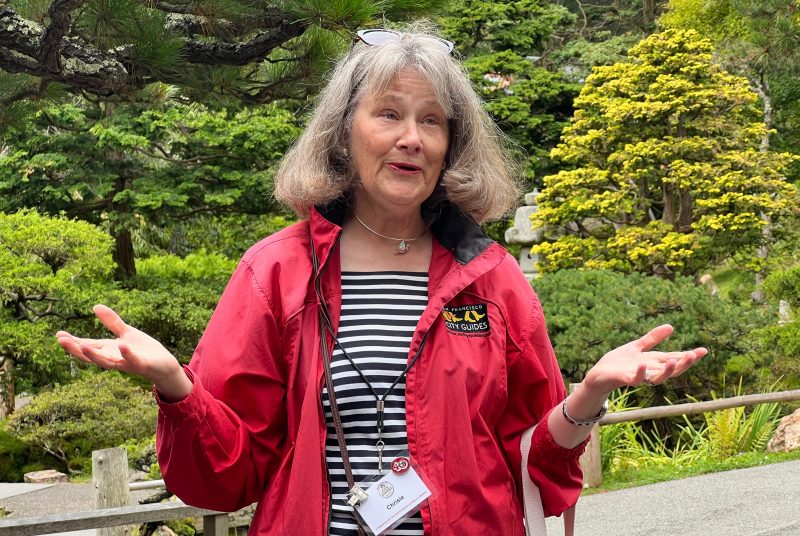It’s an overcast summer morning, and Chrisie Giordano is leading a tour of Golden Gate Park’s Japanese Tea Garden. She pauses in front of the large statue of Buddha and sheds a few tears. The tea garden, she says, is the place where she has come to terms with her daughter’s painful decision to leave her family and become a Buddhist monk.
The garden is awash with symbols of Buddhism that relate to balance, simplicity, and tranquility. Leading tours “gives me the opportunity to understand why my daughter would choose a celibate, monastic life which would take her away from our family,” Giordano says. “We would only see her occasionally. But being in the garden (gave) me the chance to understand her life path, and I get the opportunity to share my story with some of the people who come.”
Spirituality in metaphor
During the 90-minute tour, Giordano told the story of the Japanese Tea Garden to about 12 people. She discussed the history of the popular three-acre garden, pointing out bonsai trees, lanterns, the koi pond, and towering redwoods. Little in the park is there by accident. She points to the garden’s arching drum bridge and notes that its design is a metaphor. “You come to the zenith and then you have to come to the end and death. The bridge’s reflection in the water makes a complete circle and that is the circle of life.”
When the tour concluded, the 72-year-old Noe Valley resident talked about the seismic change to her family that began 10 years ago when her daughter shaved her head and said she would become a monk.
Even though she had been discussing it for years, the announcement rattled her parents. Rebecca, an identical twin, changed her name to the Reverend Vera. “It was very difficult,” Giordano said, “and certainly for her sister, too, with whom she had shared just about everything for the first 30 years of their lives.”
A welcome visit
For most of the first two years after her daughter’s decision, Giordano didn’t see Vera. Her daughter was serving as a postulant at Shasta Abbey, a Buddhist Monastery in northern California, deciding if she wanted to pursue a vocation as a monk. Even now, Giordano can visit her daughter only twice a year at the Abbey where she still lives. Vera speaks to her parents once a month on Zoom and comes home to see the family only once a year for ten days. This year she arrives in September.
“As the Buddhists remind us, attachment brings suffering,” Giordano said. “So, attachment to seeing (Vera), hugging her, and connecting with her on a regular basis made it difficult to let go.” Despite the passage of time, it’s difficult for Giordano to verbalize her feelings and explain more about the separation.
Not what you expect
Giordano’s other daughter, Amie, is a Christian pastor who has a partner, but the couple has decided not to have children. Giordano has been married to her husband, John, a former mechanical engineer, for 51 years. They are resigned to not having grandchildren. “I think that’s part of life’s journey,” she said. “Understanding that you can’t be attached to outcome, things are different than you expected, and it may take a while to come around to it.”
Both daughters graduated from Yale and are 46. They grew up as Lutherans in Connecticut, but Giordano said she and her husband encouraged them to find their own spiritual paths. Rebecca, now Vera, became a social worker in the Tenderloin. She started on the path to a religious life at the San Francisco Zen Center and the Berkeley Priory.
After Rebecca left, a friend encouraged Giordano to become a tour guide at the garden as a way to heal. She’s been leading tours for about 10 years. She encourages those who tour the Tea Garden to consider some of the spirituality they might encounter there. That spirituality, she said, can be discovered in a tree, a stone, a fish, or the water it’s swimming in.
Simple is the rule
She points out a large Monterey Pine, a California native, near the garden’s entrance. The pine is balanced, she said, by a nearby cherry tree, “which is certainly symbolic of Japan, and the blossoming of it is called sakura. It’s very ephemeral, it only lasts a short time. It’s a reminder to celebrate the beauty of life while we have it.”
Describing a small pond, she says, “The water flowing around stones symbolizes tranquility.” The tea garden is deliberately uncrowded. “The gardeners would say we’re not finished with our gardens until we have taken out everything that is extraneous. The simpler, the better. So, there are many fewer types of plants, trees, and shrubs than there are across the way in the Botanical Gardens.”
Giordano is a former junior high school teacher, who moved to San Francisco from Connecticut in 2007. She does not consider herself a Buddhist, but the time spent at the Tea Garden and her daughter’s connection to that religion has helped Giordano be satisfied with her life.
“Every time I see the Buddha’s (open) hands, I think ‘let go,’ and I see that my daughter has found something that brings her great joy. “As difficult as it was to accept Vera’s choice because I still miss her every day, I am grateful that she continues to find tranquility, simplicity, and balance at the abbey and in her life,” she said.
And Giordano has a concrete mission regarding her daughter: “As her mom, my job is to open my heart, open my hands, and let her go.”

